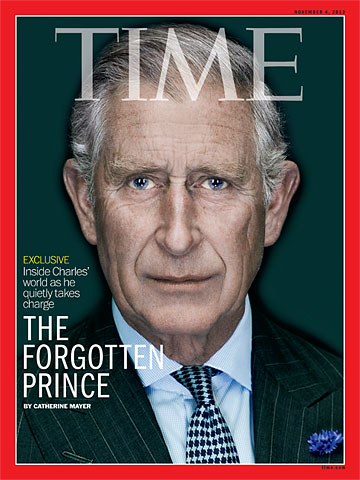
(2 of 8)
The Queen is 87 but has no intention of abdicating. Still, she's finally slowing down. Her eldest is taking on more of her workload, assuming much of the role of kingship without its sparkle. There will be more ceremonials and speeches, more scrunching of toes. On Nov. 15--17, the Prince will for the first time preside in the Queen's place at the Commonwealth Heads of Government Meeting in Sri Lanka, the biennial summit of the 53-country organization that she leads and that her successor will helm only if members agree.
He accepts these additional duties joylessly. He believes in the monarchy as a force for good but accepts that people might question its relevance. He prefers not to focus on his accession, which, after all, means losing his mother. And far from itching to assume the crown, he is already feeling its weight and worrying about its impact on the job he has long been doing. For the Prince is a passionate philanthropist, one of the world's most prolific charitable entrepreneurs and, beyond that, what his friend Patrick Holden, founding director of the Sustainable Food Trust, describes as "an amplifier of messages and a conductor of ideas." Al Gore calls the Prince "inspiring." The Prince has more than once been called a British Al Gore, but he casts his ambitions far wider.
A royal activist, he deploys his influence to move the dial on everything from climate change to community architecture, integrated medicine to interfaith relations. Viewed from palaces and limousines and the more profound distance imposed by position and tradition, all these issues appear to the Prince intimately connected with the fate of the earth, which he fears humanity is destroying--"this miraculous entity floating around in space that is linked with the extraordinary harmony of the universe." (Yes, he does talk like that, gripping the sides of his chair in a rictus of distress.)
His supporters hail him as a visionary; his detractors dismiss him as a privileged crank. Inside the bubble of his strange existence, that notion of privilege is undercut by a sense of his lifelong isolation, a childhood short on parental warmth, a sinew-toughening education that separated him from his three siblings, a culture that still sees many of those close to him bending the knee and calling him "Sir." A former girlfriend remembers their heads bumping as he moved to kiss her while she curtseyed.
He has found late happiness with his "wonderful wife" Camilla, thriving sons and baby grandson, but this complicated, instinctual, driven man still tries to reach out, to give others the ease of spirit that until recently eluded him. He aims to be a king of people's hearts, impelled, in his words, to look out for "everybody else's grandchildren" too. He leans forward, eyes shining. "I've had this extraordinary feeling, for years and years, ever since I can remember really, of wanting to heal and make things better," he says.
Is he succeeding? Any reliable assessment has to start with what he's done, not with what the polarized voices of monarchists and republicans, fans and critics, allege. He may have been born to reign, but this Prince rarely commands a fair hearing.
Growing Concerns
